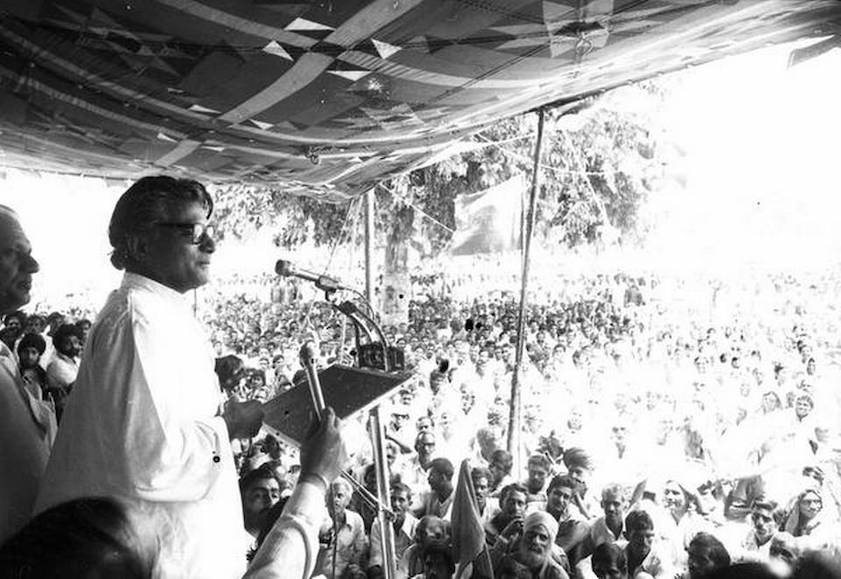George Fernandes
This is a collection of articles archived for the excellence of their content. |
Contributions
1960s onwards...: commitment to democracy and socialism
Devaki Jain, A leader of the workers, January 31, 2019: The Hindu
The writer is an economist

Photo Credit: The Hindu Archives
From: Devaki Jain, A leader of the workers, January 31, 2019: The Hindu
George Fernandes’ passionate trade union work helped mute violent conflict in democratic India
George Fernandes was one of the most vivid characters in the Indian political landscape from the 1960s onwards. He was a passionate believer in worker unions and in the socialist order. Among the cohort of laid-back political activists those days, Fernandes was a fireball — articulate, courageous and outspoken. While some of that passion got diluted with increasing engagement in formal politics, his commitment to old-fashioned democracy and socialism could never be dampened. He was a workers’ man, who, along with unionised hotel waiters, hawkers, and workers from the transport sector, could bring Bombay to a halt. In 1974, Fernandes famously led the largest railway strike that India has ever seen, which Prime Minister Indira Gandhi responded to by arresting or detaining thousands of trade unionists.
Fernandes was also a fearless dissenter. He was an anti-Emergency crusader. He spent the Emergency years in prison and even contested the 1977 elections from there. He won by a huge margin. The Janata Party was then elected to power and he was made Industries Minister in the government led by Morarji Desai.
But power corrupts. His induction into formal politics did not sit well with his personality or his actions. As Defence Minister, Fernandes was embroiled in the Kargil coffin scam. The Tehelka expose on the murky defence deals of the National Democratic Alliance forced him to resign.
But his downfall is not how we should remember Fernandes. We should remember him because he belonged to an era where leaders represented economic groups rather than castes or families. We should remember him because while at present there are many political and social leaders who may term themselves as being of the people, Fernandes was truly a man of the people.
And we should remember him because the worker in India today, whether in the formal or informal sector, is under threat. Unions face challenges right from getting themselves registered. The recent proposal to amend the Trade Unions Act of 1926 was met with protests — unions said that the government was trying to interfere in their functioning. In this era, we should remember stalwarts like Fernandes who understood that unless workers, like other professionals, are able to assert and organise power and negotiate the terms of their employment, there will be feudalism.
Worker unions were not only a vital institution for democratic India to thrive, but it was due to their propagation, aided by people such as Fernandes, that violent conflict was muted. His passing should be a reminder to support existing unions and build more unions.
Private papers
Fernandes felt betrayed by Nitish, reveal letters
Akshaya Mukul The Times of India Dec 05 2014
In the manuscripts section on the Nehru Memorial Museum & Library in a quiet corner lie the private papers of once-fiery socialist leader George Fernandes. They are yet to be catalogued and put into neat boxes.A closer examination over two days reveals that these files have nothing from Fernandes' tumultuous years from the 1960s, 70s, his leadership of a railway strike, Emergency years, the Baroda Dynamite case or even controversies of the last two decades like the sacking of Vishnu Bhagwat, the Tehelka episode or even the coffin scam.
A major chunk of the Fernandes papers concerning his public and private life remain under the safekeeping of his family, leaving the period between late 1990s to 2009 available for scrutiny . But even here one can discover some rare gems. Like Fernandes being asked by the archbishop of Delhi: `How about your reconciliation with church and god?' Or the bit where Fernandes hits out at party colleague Nitish Ku mar in a 2009 letter to old socialist as sociate Kumar Aurangabadkar: “What you mention about Nitish is correct. I brought that fellow but he went on to see that I am sidelined.“ Further research yields another an other letter the same year where Fernandes wrote to JD (U) president Sha rad Yadav about his desire to contest the Lok Sabha election from Muzaf farpur because as a “socialist I am against entering Rajya Sabha.“
The running theme of Fernandes' papers remains his enmity with Indira Gandhi specifically and Congres in particular. In one letter of June 2005 to R.S.S. chief K S Sudarshan, Fernandes admonishes him for praising Indira Gandhi. “I cannot understand how the R.S.S. can admire a person who went to the extent of saying that her Emergency rule meant that even the right to life had been withdrawn as Hitler had done in Germany ,“ he wrote. Fernandes kept the pressure on the Gandhi-Nehru family , be it sending a letter from Sten Lindstrom, Swedish police officer and prime in vestigator in the Bofors case, to the then PM Manmohan Singh seeking his help or writing to Italian home minister Giuliano Amato, a socialist, to catch Ottavio Quattrocchi of Bofors fame.
Among the hundreds of paper, most of them letters to various UPA ministers seeking help for his constituents, there is one from former US there is one from former US defence secretary Donald Rumsfeld stating, “It was with dismay that I read press reports indicating that you had not received proper treatment at US airports in 2002 and 2003. I regret that such incidents occurred.“ Fernandes thanks him for his “sentiments“ and talks of how the two closely worked to strengthen the bilateral relationship.